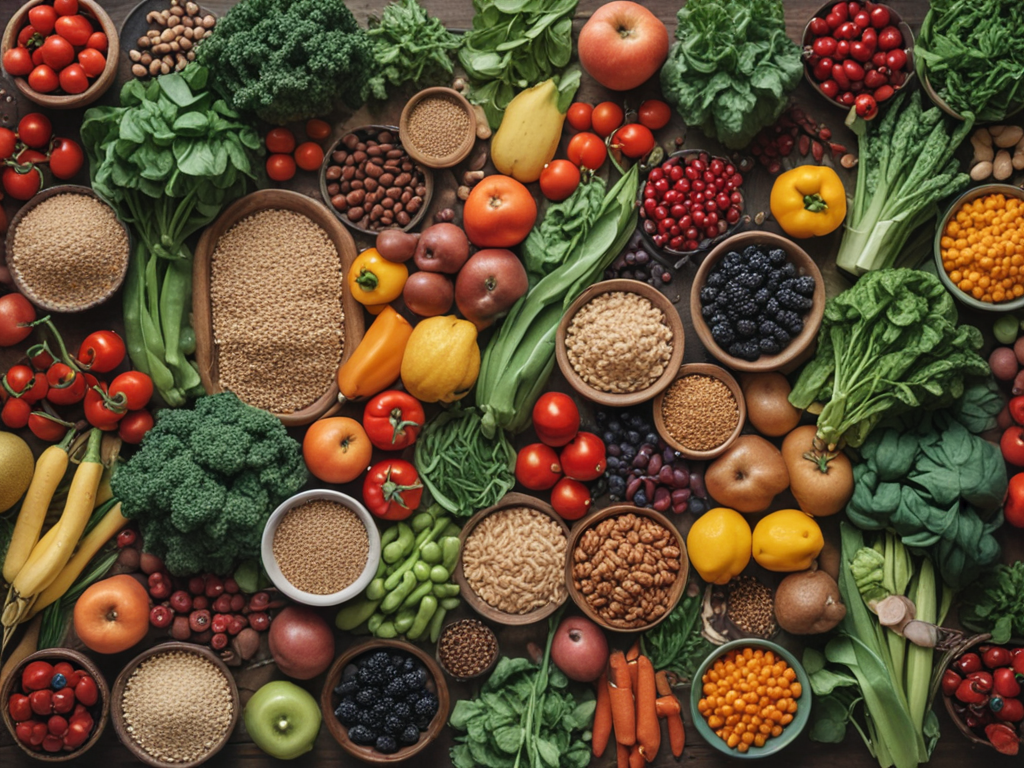
Exploring the benefits and various types of plant-based diets can be a transformative journey towards a healthier lifestyle. From understanding the advantages of plant-centric eating to discovering the nuances between vegetarian, vegan, and flexitarian diets, there’s a vast landscape to navigate. As we investigate further into this domain, we’ll uncover essential tips for shifting smoothly, overcoming common challenges, and mastering the art of meal planning with delicious plant-based recipes. Let’s navigate the world of plant-based diets together, one step at a time.
Benefits of Plant-Based Diets
Eating a plant-based diet regularly can greatly improve overall health and well-being. By focusing on fruits, vegetables, whole grains, nuts, and seeds, individuals can experience a myriad of health benefits. Plant-based diets are rich in essential vitamins, minerals, and antioxidants that support improved health outcomes such as reduced risk of heart disease, diabetes, and certain types of cancer. Additionally, plant-based diets are often lower in saturated fats and cholesterol, leading to better weight management and overall well-being.
Not only do plant-based diets benefit personal health, but they also have a positive impact on the environment. Plant-based diets require fewer natural resources and produce fewer greenhouse gas emissions compared to animal-based diets. By choosing plant-based options, individuals can reduce their carbon footprint and contribute to a more sustainable food system. Making small changes in our diets towards more plant-based options can lead to significant improvements in both our health and the environment.
Types of Plant-Based Diets
There are several main types of plant-based diets that are commonly followed for health and ethical reasons. Each of these diets has its own unique focus and benefits. Here are some of the most popular plant-based diets along with a brief description of each:
| Diet Type | Description | Focus |
|---|---|---|
| Vegan | Excludes all animal products | Ethical |
| Vegetarian | Excludes meat but may include dairy | Health |
| Pescatarian | Includes fish but avoids other meats | Balanced |
These diets vary in nutrient density and environmental impact. Vegans often need to pay closer attention to certain nutrients like vitamin B12 and iron, while pescatarians have the advantage of easily obtaining omega-3 fatty acids from fish. From an environmental standpoint, veganism typically has the lowest impact due to the reduced land and water use associated with plant-based diets. Each diet has its own merits, so it’s important to choose one that aligns with your values and health goals.
Tips for Transitioning
To smoothly adjust to a plant-based diet, consider gradually incorporating more plant-based meals into your daily routine. Start by adding one plant-based meal a day and then slowly increase the frequency. This gradual approach can help your taste buds adapt and make the shift more sustainable. Remember to maintain balance by including a variety of plant-based foods such as fruits, vegetables, whole grains, legumes, nuts, and seeds in your meals.
As you shift, it’s crucial to listen to your body and make adjustments based on how you feel. Pay attention to your energy levels, digestion, and overall well-being. If needed, consult with a healthcare provider or a dietitian to make sure you’re meeting your nutritional needs during this change.
Additionally, explore different cooking methods and recipes to keep your meals exciting and flavorful. Don’t be afraid to experiment with new ingredients and cuisines to discover what works best for you. By shifting smoothly and maintaining balance, you can successfully embrace a plant-based diet that aligns with your goals and values.
Overcoming Common Challenges
Approaching the shift to a plant-based diet may present various obstacles, but with proactive strategies, these challenges can be effectively overcome. When managing social gatherings or dining out, sticking to your plant-based lifestyle can sometimes feel challenging. Here are some practical tips to help you successfully overcome common challenges:
- Communicate: Informing your friends and family about your dietary choices can help them understand and support you during social events. Suggest potluck-style gatherings where everyone can enjoy plant-based options.
- Research Menus: Before dining out, check restaurant menus online or call ahead to ensure they offer plant-based meals. Many restaurants are accommodating and willing to adjust dishes to fit your needs.
- BYO Snacks: To avoid being caught off guard by limited food options, carry portable plant-based snacks with you when attending events or dining out.
- Explore New Places: Embrace the opportunity to discover new restaurants that specialize in plant-based cuisine. This can make dining out an exciting adventure rather than a challenge.
Meal Planning and Recipes
Exploring meal planning and discovering new plant-based recipes can revolutionize your approach to a plant-based diet, empowering you to embrace a diverse and nourishing culinary experience. When it comes to meal planning, incorporating ingredient swaps can add variety and excitement to your dishes. For instance, using cauliflower rice instead of traditional rice or lentil pasta in place of regular pasta can enhance the nutritional value of your meals.
Additionally, mastering different cooking techniques can elevate the flavors of plant-based ingredients. Roasting vegetables brings out their natural sweetness, while sautéing with a splash of soy sauce can add depth to stir-fries. Experimenting with grilling or broiling tofu can create deliciously crispy textures that mimic meat.
| Ingredient Swaps | Cooking Techniques |
|---|---|
| Cauliflower rice | Roasting vegetables |
| Lentil pasta | Sautéing with soy sauce |
| Oat flour | Grilling tofu |
| Coconut milk | Baking veggies |
| Chia seeds | Steaming greens |





